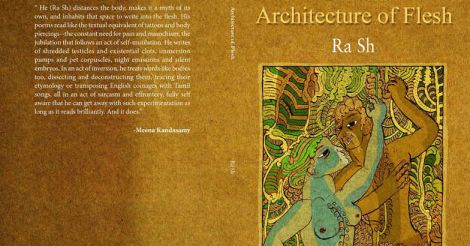Body, the source of pain and pleasure, which oozes blood, sweat and sperm, in itself is an unbearably heavy language one is burdened with. This realisation is the key to open Ravi Shanker's (Ra Sh) Architecture of flesh.
Aptly titled after the first poem of the anthology and 'covered' with a highly suggestive artwork by Bara Bhaskaran, Architecture of flesh is a book that deals with the poetics and politics of bare human body. The poems in the collection, on a variety of themes, often meet on the common motif of flesh. They at times mythicise and demysticise body.
Flesh, as raw and bloody as it is in flesh trade, manifests in manifold in most of the poems that are triggered by the times we live in. 'Stilled life', written in protest against the felling of some ancient trees in Thrissur and 'Kisses of love' written after Kerala's kissing protest against moral policing which turned violent with the intrusion of fanatic forces are instances.
Distancing themselves from the romantic idea of love unadulterated by flesh and sweat, these poems use body as not only a medium of love but strong political statements also.
Read also: Celebrate the experience of 'seeing' -- Reading S Kannan's poems
Of poetry that outlives tyranny: Interview with Chilean poet Raúl Zurita
Even as celebrating flesh and its pleasures, in a brave act of resistance, these poems recognise and reflect the ways the powerful, be it individuals or the state, inflicts pain upon the body whenever it turns to be a medium of protest. The poem 'Architecture of flesh' is in that sense is the collection in a nutshell.
Powered by the anger of the sources of injustice, the poem marks '...flesh, spiked with bamboos' in Ngariyan Maring, '...flesh, pounded into the black soil by booted pricks with brass buckles' in Gajapati and so on.
If one qualifier is a must for the book, then I would choose the word political. Be it "Kisses of love' 'Here lie', 'Eagle's I' or 'Warm is the war', the poems are sound reaction towards injustice that has its deep roots under the casteist and patriarchal societal structures. As poet Meena Kandasamy rightly puts it in her introduction “Ravi Shanker's brilliant poems stand as a testimony to our tortured, fragmented times...”
'Kisses of love' portrays three couples—two policewomen, two male poets and a boy and girl—settling into long kisses even as eyes from behind a bush watch them with stones in their hands. With the loud narratives of the so-called secret acts, the poet frowns at the 'art' of voyeurism.
While 'Here lie' with the spite and anger of a true poet reproduces the pain of the uniformed/legalised rape which a number of women suffer on a daily basis, 'Warm is the war' picturises peace which is as warm as 27 torsos, 261 fingers, 46 eyeballs and so on. The poem makes a mockery of the peace that war brings—a theme as old as the epics but presented in the Ra Sh way.
It's good to note that even as being highly resistant and radical in nature, the poems do not turn to be hollow slogans. With an accurate choice of words that suit the many themes, unusual metaphors— “Hospitals are bombed mass graves”, one poem begins thus—and subtle humour, Architecture of flesh marks the changes contemporary Indian poetry in English has been undergoing in style and substance.


























Disclaimer
The comments posted here/below/in the given space are not on behalf of Manorama. The person posting the comment will be in sole ownership of its responsibility. According to the central government's IT rules, obscene or offensive statement made against a person, religion, community or nation is a punishable offense, and legal action would be taken against people who indulge in such activities.